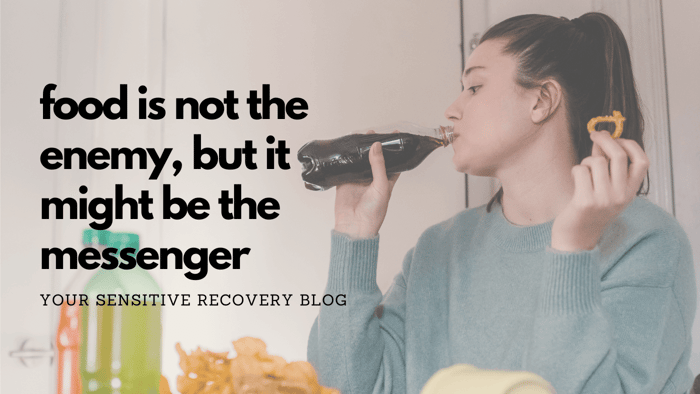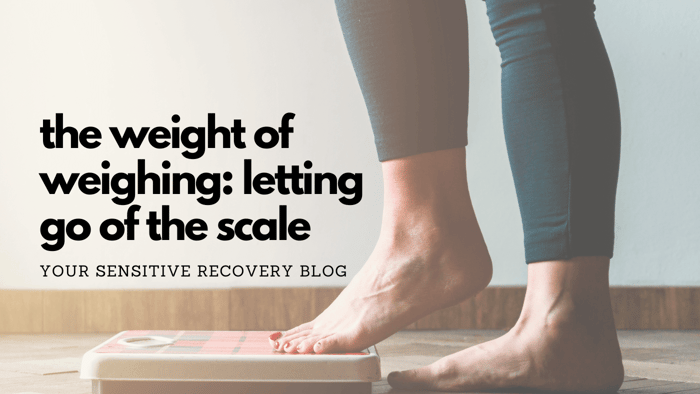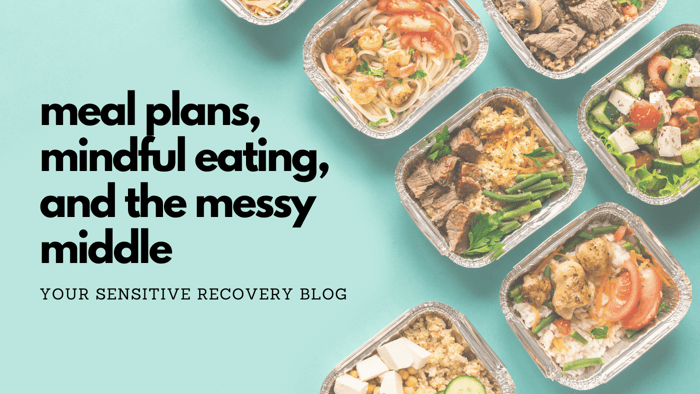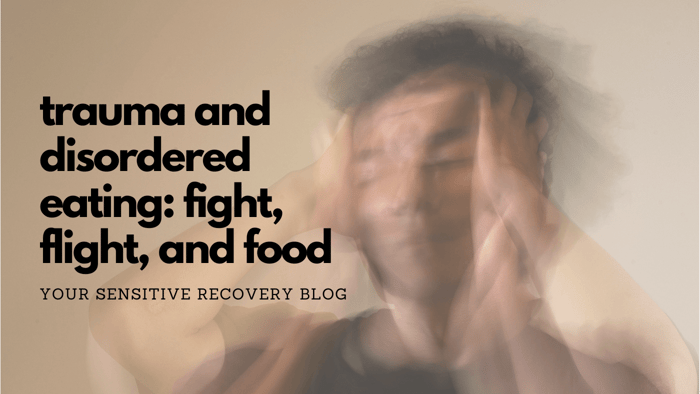In our weight-loss-focused society, we often hear talk about food as if it's the enemy, something to fight, resist, or control. But what if food isn’t the villain in your story? What if it’s the voice trying to speak the truth of your emotional experience?
For sensitive souls who have been disconnected from themselves through overwhelm, traumas, or conditioning, our bodies and behaviors can often speak louder than our conscious awareness. Food, then, becomes a kind of emotional translator, showing up in patterns, cravings, or compulsions that carry hidden messages.
If you're familiar with me, you know I firmly believe that food choices are neither good nor bad, but they are meaningful.This post explores how food might be trying to speak to you, and how, by tuning in, rather than cracking down or numbing out, you can find peace and healing.
The Way You Eat Can Tell a Story
The things you crave, the way you approach eating, and the patterns you create around food are often shaped by more than hunger. They’re shaped by your history, your environment, your relationships, and, most powerfully, your emotions.
For example:
- Eating quickly might indicate a sense of urgency, fear, or a need to numb.
- Restricting might reflect a need for control, perfection, or to disappear.
- Eating past fullness might signal emotional deprivation, self-soothing, or a desire to feel comforted or “held.”
- Craving sugar or carbs could be your nervous system’s way of seeking quick energy or emotional regulation in times of stress or exhaustion.
- Craving crunchy items can indicate a need to process anger or frustration.
None of these behaviors makes you weak, bad, or broken. They make you human. They tell us something about what you’re going through and what your system is trying to manage.
Food Behaviors as Emotional Clues
Let’s break this down further with some common emotional states and how they can show up through food. Remember, everyone is different, so you may resonate with different combinations of feelings and behaviors.
1. Loneliness 👉 Eating to Feel Full
Most people experience a deep longing for connection, but some of us end up feeling overwhelmed in social spaces. Eating may become a surrogate for closeness when you're isolated or struggling to connect. It can be a way to “fill” emotional emptiness. It's perfectly human to seek comfort like this.
2. Overstimulation and Overwhelm 👉 Controlling Food
When the world feels too big or too loud, controlling what you eat can feel like a lifeline. It offers structure, predictability, and a way to create order. This is especially true if you grew up feeling like your emotions and experiences were "too much" for other people. Restriction or rigidity might be your nervous system’s way of saying, "I need safety."
3. Shame 👉 Secretive or Chaotic Eating
If you grew up believing that your needs were “too much,” you might feel shame for eating at all. This can lead to secretive eating or cycles of binge eating followed by restricting. Rather than judging the behaviors, ask what your shame is protecting. What parts of you were never allowed to be seen, or were criticized if they were?
4. Fatigue 👉 Craving Quick Energy
If you're tired (emotionally, mentally, or physically), your body may crave sugar, caffeine, or high-carb foods. These substances are the quickest forms of energy for your body. This isn’t a failure of willpower. It’s biology, and it's important that you pay attention to what your body is telling you.
Food Is Not the Problem; It’s a Signal
So often in recovery, we try to “fix” eating behaviors directly. There's nothing wrong with that, but when we do so without addressing the underlying emotions, we miss the point, and we could miss the healing.
Instead, we can get curious.
Rather than saying, “Why can’t I stop eating this?”
Ask: What am I really hungry for?
Rather than saying, “Why do I keep doing this when I know it’s harmful?”
Ask: What am I trying to control or avoid?
The shift from judgment to inquiry changes everything. It makes room for compassion and allows food to become a guide, not a battleground.Listening to the Messenger: A Gentle Practice
Here’s a gentle practice you can try the next time you notice yourself in a challenging moment with your eating choices or habits:
1. Pause
Before jumping to judgment, analysis, or self-shaming, take a slow, deep breath. Perhaps change your environment slightly, like stepping outdoors or into a quiet space. Put your hand on your heart. Just notice what’s happening.
2. Name it to Tame it
Name the behavior, without judgment. Keep the tone neutral. This is just information.
“I’m eating even though I’m not hungry.”
“I’m avoiding food right now.”
“I’m craving sweets.”
3. Take Note of What You’re Feeling
With gentle curiosity, check out what your body might be trying to manage for you.
"What am I feeling right now?"
"What was going on just before this moment?"
"Was there a conversation, memory, stressor, or shift in mood?"
4. Offer Compassion
Instead of forcing yourself to simply stop the behavior, see if you can first offer a supportive message first.
“No wonder this is hard. I'm carrying a lot right now.”
“It makes sense that I want comfort."
“I am allowed to feel this way.”
If you still want to eat, that’s okay. This isn’t about stopping behaviors; it’s about connecting with yourself through them. Behavioral change without this skill is much more difficult.
Recovery Involves Trust
So much of traditional recovery work focuses on shifting what and how you eat. But true healing requires something much deeper: reconnecting to the messages beneath the behavior.
When you stop fighting the messenger and start listening to the messages, you begin to build trust with yourself, your body, and your emotions.
And that’s the heart of recovery. That’s what makes it sustainable.
If this post resonates with you, please know you’re not alone. Many sensitive souls carry deep stories around food, and many of those stories are not really about food at all. So be gentle with yourself. The messages your body is trying to send are not betrayals, they're invitations.
You don’t have to decode them perfectly. You just have to be willing to listen. 💕
✨ Josie Munroe, LMFT is a licensed therapist and owner of JosieMunroe.com and Your Sensitive Recovery. As a recovered clinician and Highly Sensitive Person, she loves supporting others on their journeys to form new, empowered relationships with food, their bodies, and their sensitivity. Join the newsletter for a weekly boost of hope and inspiration. You deserve a recovery that works for you! ✨





